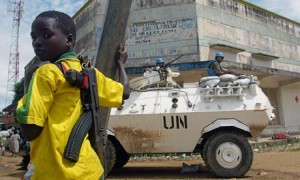By Tara Pistorese
Impunity Watch Reporter, Africa
BAMAKO, Mali—The Economic Community of West African States (ECOWAS) has called for the formation of a Malian “national unity government” in light of present humanitarian disaster.

Led by Captain Amadou Sanogo, the National Movement for the Liberation of Azawad (MNLA), a largely Tuareg rebel group, staged a coup d’état on March 22, ousting former President Amadou Toumani Toure one month before elections were to take place. The Islamist group, Ansar Dine, meaning “Defenders of Faith,” soon joined the rebellion.
The coup was internationally condemned by the United Nations Security Council, the African Union, and ECOWAS, among others. After facing considerable regional and international pressure, the rebels agreed to relinquish power over the area to a civilian government. However, the coup stagers have retained substantial influence in the northern parts of the country.
The instability of the current interim government, led by President Dioncounda Traore, has alarmed the international community, especially considering of the eighteen million people presently at risk of starvation and one million children facing immediate danger.
In May, President Traore sustained injuries after a group of coup supporters attacked him in his office. He has been treated in Paris, France and has not returned to Mali since the incident. The rebel alliance, too, has recently ruptured as Islamist fighters reportedly chased Tuareg rebels out of several northern towns.
Last week, Islamist fighters invaded cemeteries housing the remains of Sufi Saints of Timbuktu, a city listed on the World Heritage List by the United Nations Educational, Scientific, and Cultural Organization (UNESCO) as one of particular international significance.
The rebels, who believed the memorial to be inconsistent with Islamic law, methodically destroyed the six of the most famous tombs, an attack that may be considered a “war crime” by the International Criminal Court (ICC).
“The destruction of historical sites is outrageous,” said UN Deputy Secretary General Jan Eliasson. “Extremist groups and criminal networks are spreading rampant fear and insecurity. Weapons are being [trafficked] over porous borders.”
Earlier this month, six West Africa leaders met in Ouagadougou, Burkina Faso and, after considering the crisis in northern Mali, identified strategies for Malian authorities to implement as a “roadmap to end the crisis.”
Although leaders of the Ivory Coast, Niger, Togo, Benin, and Nigeria, attended the meeting, the interim Malian President and the nation’s Prime Minister, Cheikh Modibo Diarra, whose relations with ECOWAS have been strained, were absent. In a similar vein, a number of northern representatives walked out just prior to the opening of the meeting for unknown reasons.
While some blame the President’s nonattendance on the attack suffered in May, others believe his failure to report had more to do with his perceptions of Mali.
In addition to the formation of a new regime, ECOWAS and the United Nations (UN) has urged Malian leaders to end the political strife in Mali by July 31, before the Ramadan Muslim month of fasting. According to ECOWAS, failure to do so will result in Mali’s suspension from sub-regional groups and forfeiture of ECOWAS recognition.
Furthermore, ECOWAS has encouraged President Traore to request the deployment of ECOWAS forces to restore order to the area. ECOWAS has approximately 3,300 troops ready to enter the conflict zone.
“[The leaders] are asking the ICC to proceed with necessary investigations to identify those responsible for war crimes and to take the necessary action against them,” read a statement issued by ECOWAS.
However, in a telephone conversation from an undisclosed location in northern Mali, a representative told Al Jazeera that Ansar Dine did not recognize either the UN or the ICC.
For further information, please see:
Xinhuanet—Leaders at AU Summit Express Deep Concern with Crisis in Mali, DR Congo—15 July 2012
Al Jazeera—ECOWAS Call on ICC Over “War Crimes” in Mali—7 July 2012
BBC News: Africa—Mali Interim Government Urged by ECOWAS—7 July 2012
Raw Story—West African Presidents Urge War Crimes Probe in Mali—7 July 2012



